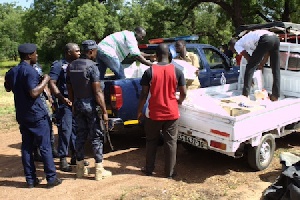Anas goes undercover to unmask the silent killers Impoverished and famished by a corrupt administrative system that has festered and flourished nationwide, malnourished Ghanaian children watch in anguish as special food meant for free distribution to them are stolen by roguish officials to the finish.
Though furnished for free distribution, the food is flagrantly filched from the frail fingers of the unfortunate kids by officials in a stealing free-for-all.
The special foreign aid food is supplied up north by the World Food Programme (WFP) and is filled with vital nutrients for the poor children.
It is in the afternoon and the sun scorching usually characteristic of northern Ghana, this specifically also happens in the Upper East Regional capital of Bolgatanga. The people here are seen briskly going about their daily activities and businesses.
They are the normal citizens engaged in hard work that earns them their daily bread. Whiles they do so; some others in broad daylight are engaged in parochial activities that negatively affects malnourished children badly in need of food.
The type of food is one that is sent into Ghana by the World Food Program (WFP) -high nutrition based food that WFP supplies to the Northern Regions and parts of the Volta region; as it does in several other poverty endemic regions across Africa and the world.
These foods are supposed to be administered by the Ghana Health Service Directorate. They are for free and are meant for malnourished persons- especially children. Yet, a connivance between the distribution supervisors and some business people results in the repackaging and the sale of these foods on the open market.
This story details how the investigative team led by Anas Aremeyaw Anas, rattled the syndicate and ruffled the feathers of the criminals who were actively engaged in the illegality of selling WFP food on the open market.
The investigation patiently infiltrated and dealt extensively with the people who sold food meant to be distributed for free. It also went further to have extensive interactions with the people who patronize these foods and also brought to bear the plight of others who were denied it.
Illegally Traded
WFP supplies over 100 foods (cereals and non-cereals) across the globe. In Ghana however, they collaborate with the Governments of Ghana and Canada to supply five types of food to deserving groups in the Northern Ghana.
The special foods are Super Cereal Plus (a corn soya blend), white maize, white pea beans, iodized salt and cartons of “palmolein,” fortified bleached deodorized oil.
a. Super Cereal Plus – The super cereal plus is a corn soya blend which contains special nutrients and is prepared according to a special formula for infants and young children who are six months and above.
It is usually in a 1.5 kg shiny package. These packs are further put into cartons; nine pieces in each carton. The main ingredients are corn and soya, but it also contains sugar, milk powder, vegetable oil, minerals and vitamins.
b. White Pea Beans and Maize – these were also specially produced nutrition based cereals that were supposed to be distributed particularly to malnourished children in the regions.
They came in white sacks measuring 50kg. They had bold inscriptions of the WFP, the production and expiry dates, the names of the producer and vendor and an inscription; ‘A Gift of Canada.”
c. Palmolein – this is fortified bleached deodorized oil which is part of WFP’s food basket here in Ghana. The highly nutritious oil is produced in Indonesia and brought to Ghana.
They are stored in 5 liter white gallons, and then further kept in cartons; each carton containing 6 gallons of oil.
d. Iodized Salt – Iodized salt classified under WFP’s non-cereal food item was meant for a targeted population. It is aimed at reducing and or preventing the incidence of goiter which is a consequence of consuming un-iodized salt. It was contained in plastic packs also with inscriptions all over it.
As conspicuous as the labeling of these products were, it was surprising that some of the ‘dealers’ did not even bother to conceal the labeling and inscriptions on these products. To them; what mattered was that there was a buyer with money.
Dramatic Raid: Solomon’s Arrest
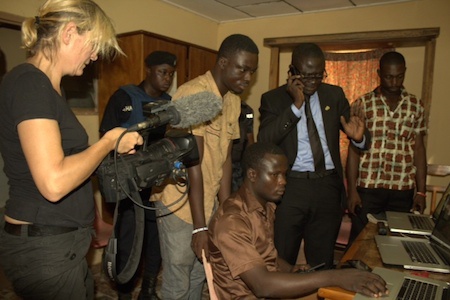 As computer set up interlaced with satellite tracking technology beams happenings on the ground, personnel of our investigative team exchange information over the walkie talkie; keeping an eye on every movement that the dealers made. This is a brief description of our makeshift operational command center in Navrongo.
As computer set up interlaced with satellite tracking technology beams happenings on the ground, personnel of our investigative team exchange information over the walkie talkie; keeping an eye on every movement that the dealers made. This is a brief description of our makeshift operational command center in Navrongo.
Navrongo, is a major town situated on the north-west of Bolgatanga; the Upper East regional capital. It is here that the investigative team picked its first signals of the illegal trading of foods meant for free distribution by the WFP.
These foods are supposed to be kept at District Nutritional Offices of the Ghana Health Directorate for onward supply to hospitals, clinics, health posts and care homes; yet a breach of trust and abuse of authority and sheer criminality resulted in their sale for parochial ends.
Whiles undercover, we met one Solomon Saanye who introduced himself to us as the District Nutritional Officer in Navrongo and was directly in charge of these foods.
On several occasions, we negotiated with him for the purchase of the WFP items including bags of white pea and white maize, cartons of Super Cereal Plus, Iodized Salt and Palmolein Oil. We paid him on each occasion before he agreed to release the items.
After months of dealing with Solomon, it was time to stop him from further perpetrating illegality on malnourished kids and PLHIV; the team informed the Upper East Regional Police Command of our findings.
A dozen officers led by the deputy regional crime officer of the Upper East Region were put on standby, as our team went in for another round of negotiation with Solomon at his residence.
The transaction was recorded on hidden camera and transmitted to the operation room to afford the entire team a full idea of events as they unfolded.
Solomon: Charlie, see my dress, we went to Upper West, and the road is not good.
Tiger: Is it not a tarred road?
Solomon: No! It isn’t a tarred road. We thank God, if not we would have gotten back around 5pm. It is a very bad road, potholes, hmm! You have come right?
Tiger: Yes!
Solomon: You won’t take the goods today?
Tiger: No! I told you that he’ll come with a car in the night
Solomon: When?
Tiger: Exactly when I don’t know. I may have to call him. He called me this morning to ask me if I have been able to see you.
Solomon: So the gallons?
Tiger: Because the thing is if I want to carry the things out of here, it is going to create a lot of problem, so he’ll just bring the car and we’ll come and carry them.
Solomon: This is the oil. 1, 2, 3, 4, and 5, this is it; take that one too.
Tiger: He’ll be shocked if he sees these goods
Solomon: The other one; the blend I would still be looking around to see if I can get you some.
Tiger: Okay!
Solomon: If I can get you about ten or….! So as and when it is ready you come for it.
Tiger: Okay!
Solomon: You have seen them here.
Tiger: Yeah!
Solomon: He hasn’t asked for maize yet, I don’t think he needs maize.
Tiger: I don’t know. I am sure he’ll need it. This maize is good when used for porridge right?
Solomon: It is, it just that it has been kept for long. I would keep it when he comes.
Tiger: Don’t worry; he would be coming for it.
Solomon: They’re about 20bags in all
Tiger: So you want to help us with your motor, right?
Solomon: Eii my brother…!
Tiger: Let me give you your money so I can leave. I am also doing some washing.
Solomon: I’ll go to other health facilities and see if I can get some other food stuffs and by the time he comes it would have been ready.
Tiger: Is the money complete?
Solomon: Yes!
Tiger: According to him, he was just telling me about the maize, he said when he comes and there’s money; you would talk some more business.
Solomon: So which money is this one?
Tiger: It is for the oil and blend food.
Solomon: Then, it is not complete
Tiger: Are you sure?
Solomon: Yes, because this one the oil alone is nine hundred GHs900.
Tiger: The one in the store?
Solomon: Yes! Has he not informed you?
Tiger: Actually, what he was telling me is that when he comes whatever that it is you two would sort things out, but first of all I should give you GHs1000. That is what he told me; actually he has not told me that this is the bargain you and him have made.
He just told me that I should give you the GHs1000 and when he comes you would talk some more. But you insist I just gave you GHs900?
Solomon: Yes!
Later, payment was made to Solomon by Anas in disguise. After making those payments to him and loading the bags of maize and corn that we had bought, we requested if he had some more bags to sell; with no goods available at his house, he suggested that we go to the Health Directorate warehouse to get the remaining bags.
From the warehouse, we would go with him to our hotel and make final payments of the transaction sum to him -that is when the Police would be alerted to accost him.
Things however took an unexpected turn when Solomon wanted the loaded bus to take the lead to the hotel so that he would go with Anas back to his residence to pick something he had left behind.
After satisfying himself that all was well by taking Anas on a round trip through the Navrongo Township, he headed for the hotel where the team was waiting and was finally arrested by the Police team.
Our investigations also showed that he was in league with the shopkeeper, one Lawal; who had the keys to the warehouse. He always allowed Solomon and his ‘associates’ to have access to the warehouse and cart away as much food as Solomon orders to be taken. Both men are now in the grips of the law.
After the arrest, the team proceeded with the purchased goods and the suspect to the health directorate and invited the head of the directorate to see what was going on under her district.
She confirmed that the goods were those that were supplied by the WFP to be distributed to malnourished children in the region. She also confirmed that Solomon was indeed an employee with the Ghana Health Service.
Gunshots, Attempted Escape
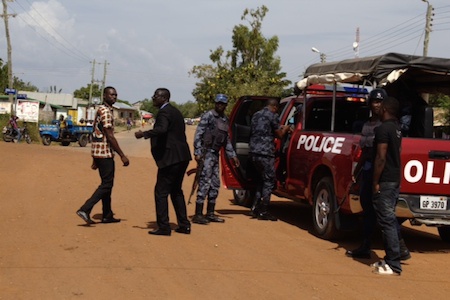 After a successful operation in Navrongo, the team set out to accost another dealer who was stationed in Bolgatanga. He was called Anao Guy; a reliable trader who we paid various sums to in respect of all five items supplied by WFP.
After a successful operation in Navrongo, the team set out to accost another dealer who was stationed in Bolgatanga. He was called Anao Guy; a reliable trader who we paid various sums to in respect of all five items supplied by WFP.
We first met his accomplice at the Bolgatanga market. He in turn led us to meet Anao at his residence. The meeting was supposed to be a quick one, where Anas and another investigator would make final payments and cart the goods away.
But before that, hardworking and smart Anoa had a plan to beat any security officer who might stop us on the way. He advised and aided us to change the labeling on the oil gallons and to also repackage the other purchases into different containers.
He further arranged for us to have motorbikes with buckets to transport our goods to our destination.
Over the months that we investigated his illegal trade, he was kind enough to allow us to store the goods that we purchased with him. The last payment date was when the team went in with the police to arrest him.
This was however not without incident as he and his accomplices attempted to escape upon seeing the police.
It took the police to fire a warning shot and the physical restraining effort of Anas and his team of investigators to thwart Anao and his guys, who were arrested by the police.
The Northern Ghana Trail
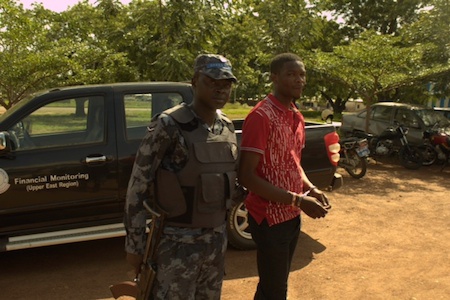 According to information on WFP’s website: “The Northern, Upper East and Upper West Regions also have some of the highest rates of malnutrition in the country; four out of ten children under the age of five are stunted or chronically malnourished, meaning that they will not be able to meet their full growth potential. Nearly thirty percent of people in the Upper East Region do not have adequate access to food, as compared to a national average of five percent.”
According to information on WFP’s website: “The Northern, Upper East and Upper West Regions also have some of the highest rates of malnutrition in the country; four out of ten children under the age of five are stunted or chronically malnourished, meaning that they will not be able to meet their full growth potential. Nearly thirty percent of people in the Upper East Region do not have adequate access to food, as compared to a national average of five percent.”
Further statistics states that in most development indicators, the Northern part of Ghana was lagging behind. Six out of ten people in the northern regions are poor compared to two out of ten down south.
The WFP, in an effort to achieve one of its four main objectives; “reduce under nutrition and break the cycle of inter-generational hunger,” supports communities around the world with cereal and non-cereal foods, meant to be supplied at no cost.
Acute malnourishment especially in children and its effects on the people of northern Ghana was the major reason for the supply of these special foods to sick children and persons living with Human Immune Deficiency Virus (PLHIV).
Deepening the Poverty Cycle: The People Denied their due
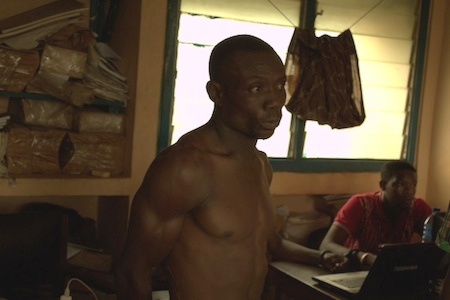 I made a trip to the King’s Village Health Center in Tamale where staff were assiduously working to assist people at risk of acute hunger in the regions; pregnant women and babies.
I made a trip to the King’s Village Health Center in Tamale where staff were assiduously working to assist people at risk of acute hunger in the regions; pregnant women and babies.
Dr. James is the director of the center since the clinic was opened in 2008. According to him; “Hunger is a big thing, and particularly in our region, about 40% of all under 5s in the communities we sampled are stunted and malnourished.
“It has an effect on mental abilities. People go to school and they come and you teach them but they do not understand. If you are malnourished, you are hungry, right from childhood it affects who you become in the future,” he added.
He is particularly scandalized at the notion held by conservative traditionalists that malnutrition has more to do with evil spirits than with feeding a child the right nutrients required to grow properly.
“The people here believe that malnutrition is not actually caused by food. They believe that it’s spirits, evil spirits and for them sometimes if it gets too extreme they think that it is not worth keeping the child so in certain instances what they do is they get rid of you,” he bemoaned.
Since the center was opened, it has served over 160,000 people living in 238 communities across the three regions. Dr. James and his team have saved over 3000 babies and young children who would otherwise have died from the lack of food.
A signal of the sale of these stolen products being a hot cake in most parts of the northern regions came up when this reporter and his team visited major markets to interact with traders in similar foods.
Most of the market women confirmed that these foods were food meant for malnourished children but said more often than not; nurses brought these foods to sell to them.
Knowing the illegality of the trade, they confirmed that in most cases, they wanted these items put in unlabelled sacks and containers when their partners were supplying them.
Solomon and Anoa’s actions were likened to murder by a very disturbed Dr. James. “It is a very unfortunate situation, this is comparable to murder, because a lot of people are malnourished and a lot others are dying in the communities.
And having seen this, it is not really the issue of the food not being there as I used to think. In this community where there are so many malnourished children and these people are deprived of what could save their lives…. It is a crime. It is the highest crime,” he insisted.
He is however quick to add that, the findings from the investigation should herald a new era in vigilance when it comes to policing food supplies.
“What you just shown means that all of us need to be very vigilant, especially with the reporting systems. How much have I received … I need to be able to go the extra mile to ensure that at least the directors who monitor the distribution know that I have actually received x number if I was given x number,” he concluded.
This investigative piece is titled “Cereal Killers” and it unmasks the criminals within the Ghana Health Service who facilitate thievery.
It is also due to be aired on Aljazeera TV according to the following schedule: 3rd December, 2014 at 22.30 GMT; 4th December at 09.30 GMT; 5th December at 03.30 GMT;6th December, at 16.30 GMT and 7th December at 05.30 GMT.
General News of Thursday, 4 December 2014
Source: Anas Aremeyaw Anas
Anas goes undercover to unmask the silent killers
Entertainment


